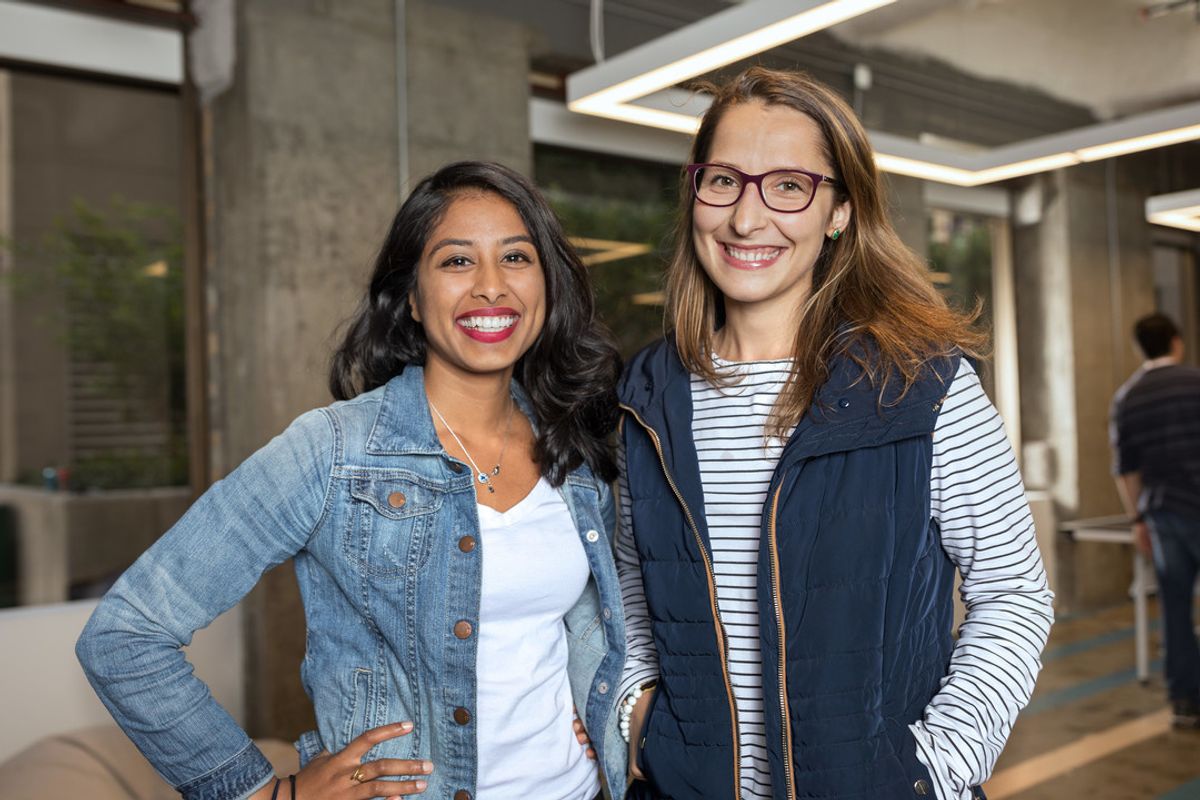Below is an article originally written by Liane Hornsey, the SVP & Chief People Officer at PowerToFly Partner Uber, and published on May 17, 2018. Go to Uber's page on PowerToFly to see their open positions and learn more.
Every week, we run a global all hands meeting for our 18,000 Uber employees. For one hour, teams from all over the world join in one conversation led by our CEO Dara and other leaders who share important updates and answer audience questions. Without fail, one of the most frequent questions that comes up is, with everything we're doing to improve our culture, fix our relationship with drivers, and turn over a new leaf with cities and regulators, when are we really going to tell the world about it?
I'm happy to say that we're finally doing that with our Moving Forward campaign that launched earlier this week. While for many people this may look like the first sign of our new direction at Uber, it's actually far from it. The truth is, we have been working on getting to this point for many, many months. But a lot of the cultural changes we've been making at Uber are not immediately visible or obvious. And that's by design—we knew that creating a new Uber would require more than slapping on a fresh coat of paint and new curtains. Curb appeal is easy; seismic retrofitting is not. I want you to know that Uber is doing the hard and necessary and often invisible work to transform ourselves from the inside out. The fact that employees keep asking the question is a good sign. Rather than being too focused on the superficial, I believe they are anxious for us to tell our story because they can feel the change.
As I said in my last blog, my goal is to make Uber the most inclusive company on the planet where all employees feel safe, supported and empowered to be successful. The past year has been an incredible journey and we've made meaningful progress with the introduction of our cultural norms; revamping our end-to-end hiring practices and performance management process; implementing and retaining pay equity in the aggregate between women and men and between all racial groups; and other initiatives we've undertaken as a result of deeply listening to our employees' needs and figuring out how to be more responsive, transparent, inclusive and caring in everything we do.
In our internal policies, for example, we put a lot of effort into adding and improving benefits that support families. We established global standards for parental leave to support both women and men in taking healthy time off to welcome a new child, and introduced new policies for telecommuting and part-time work to accommodate more flexible ways of working. We hosted Take Your Children to Work Day a few weeks ago and I was delighted to see many more employees participating and showing off their workplace to their toddlers. It was a really joyful day. My hope is that we are becoming an employer of choice because of what we have learned and continue to learn by listening, and how we are responding with big, bold moves in the right direction.
We are starting to see some encouraging results in our workforce representation, although we still have more to do. In April we shared our 2018 Diversity Report that showed modest progress on the proportion of women in the workforce (+1.9%), women in tech (+2.5%), and women in tech leadership (+4.3%) compared to 2017. We also saw gains in the proportion of underrepresented groups in leadership (+2.5%) and in tech (+3.1%). For the first time, we gave employees the option to voluntarily self-identify as LGBTQ so that we could get a more accurate and inclusive snapshot of our employee base. And we've brought in a new chief diversity & inclusion officer, Bo Young Lee, who is giving us a fresh and fearless perspective on what it will take to really move the needle.
I'm confident that Uber is changing for the better, but don't just take my word for it—you can hear it directly from our own employees. This terrific interview with Sophia Vicent, director of technical program management, talks about her journey as a woman in tech and how she overcame impostor syndrome and built Uber's technical program management function from the ground up. Robin Tolochko, a designer on the Maps team, wrote about what it's like to be a feminist at Uber. I was also incredibly inspired by the story of Benito Sanchez, a formerly undocumented immigrant who went from picking strawberries to landing an internship and eventually a career as a software engineer at Uber. These are just a few of the incredibly talented people at Uber who are helping to change the way we move.
While my mandate as Chief People Officer is to continuously improve the experience of our employees, the truth is, what we do internally and externally is all connected. What we have discovered over the past year, in particular, is that how we treat our employees and drivers matters to our riders. How we treat our drivers and riders matters to employees. Doing the right thing—one of our cultural norms—can't happen in a silo. Our commitment to change has to be consistent and steady across all of our audiences.
Which brings me to our other big news: earlier this week Uber's chief legal officer, Tony West, announced three important new developments in his blog Turning the lights on: Uber is no longer requiring mandatory arbitration of claims related to sexual assault or harassment (drivers, riders, employees); survivors will be able to settle their claims without a confidentiality provision; and we will publish a safety transparency report and help develop an open-source, standard taxonomy for classifying incidents so that overall reporting is more accurate.
These changes may seem symbolic or abstract, but I want to emphasize how truly meaningful they are. Combined with the new safety features we rolled out a month ago, Uber is stepping out in front to play a bigger role in ensuring that all of our constituents can have a safe experience, and in the unfortunate event that they don't, they are able to seek redress in a way that is fair and transparent and respects their dignity.
I'm proud that we've come so far and we're taking action in a way that isn't just skin deep but is lasting and profound. It may not be something you can easily see, but I certainly hope that as a rider, driver, eater, courier, employee or member of our community, you will feelour commitment to change.
Thank you and let's move forward together.
Liane




